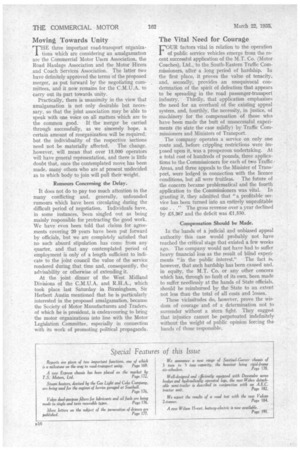Moving Towards Unity
Page 30

If you've noticed an error in this article please click here to report it so we can fix it.
"THE three important road-transport organiza tions which are considering an amalgamation are the Commercial Motor Users Association, the Road Haulage Association and the Motor Hirers and Coach Services Association. The latter two have definitely approved the terms of the proposed merger, as put forward by the negotiating committees, and it now remains for the C.M.U.A. to carry out its part towards unity.
Practically, there is unanimity in the view that amalgamation is not only desirable but necessary, so that the joint association may be able to speak with one voice on all matters which are to the common good. If the merger be carried through successfully, as we sincerely hope, a certain amount of reorganization will be required, but the individuality of the respective iections need not be materially affected. The change, however, will mean that over 15,000 operators will have general representation, and there is little doubt that, once the contemplated move has been made, many others who are at present undecided as to which body to join will pull their weight.
Rumours Concerning the Delay.
It does not do to pay too much attention to the many conflicting and, generally, unfounded rumours which have been circulping during the difficult period of negotiation. Individuals have, in some instances, been singled out as being mainly responsible for protracting the good work. We have even been told that claims for agreements covering 20 years have been put forward by officials, but we are completely satisfied that no such absurd stipulation has come from any quarter, and that any contemplated period of employment is only of a length sufficient to indicate to the joint council the value of the service rendered during that time and, consequently, the advisability or otherwise of extending it.
At the joint dinner of the West Midland Divisions of the C.M.U.A. and R.H.A., which took place last Saturday in Birmingham, Sir Herbert Austin mentioned that he is particularly interested in the proposed amalgamation, because the Society of Motor Manufacturers and Traders. of which be is president, is endeavouring to bring the motor organizations into line with the Motor Legislation Committee, especially in connection with its work of promoting political propaganda.
The Vital Need for Courage
FTOUR factors vital in relation to the operation of public service vehicles emerge from the recent successful application of the M.T. Co. (Motor Coaches), Ltd., to the South-Eastern Traffic Commissioners, after a long period of hardship. In the first place, it proves the value of tenacity, and, secondly, provides an unequivocal condemnation of the spirit of defeatism that appears to be spreading in the road passenger-transport industry. Thirdly, that application emphasizes the need for an overhaul of the existing appeal system, and, fourthly, the necessity, in justice, of machinery for the compensation of those who have been made the butt of unsuccessful experiments (to state the case mildly) by Traffic Commissioners and Ministers of Transport.
The company operates a service on only one route and, before crippling restrictions were imposed upon it, was a prosperous undertaking. Al a total cost of hundreds of pounds, three applications to the Commissioners for each of two Traffic Areas, and three appeals to the Minister of Transport, were lodged in connection with the licence conditions, but all were fruitless. The future of the concern became problematical and the fourth application to the Commissioners was vital. In granting it, they admitted that "a profitable service has been turned into an entirely unprofitable one. . ." The gross revenue over a year declined by £5,367 and the deficit was £1,550.
Compensation Should be Made.
In the hands of a judicial and unbiased appeal authority this case would probably not have reached the critical stage that existed a few weeks ago. The company would not have had to suffer heavy financial loss as the result of blind experi ments "in the public interest." The fact is, however, that such hardship has been caused and, in equity, the M.T. Co. or any other concern which has, through no fault of its own, been made to suffer needlessly at the hands of State officials, should be reimbursed by the State to an extent not less than the total of all costs and losses.
These vicissitudes do, however, prove the wisdom of courage and of a determination not to surrender without a stern fight. They suggest that injustice cannot be perpetuated indefinitely without the weight of public opinion forcing the hands of those responsible.




























































































